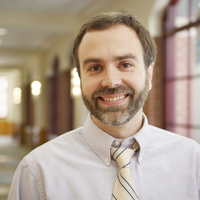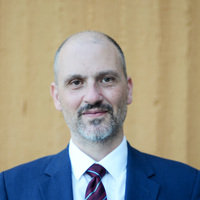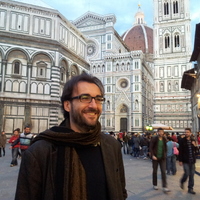Books by Valfredo Maria Rossi
Brill, 2020
This monograph traces the significant contribution that Carlo Passaglia (1812-1887) has made to C... more This monograph traces the significant contribution that Carlo Passaglia (1812-1887) has made to Catholic theology, paying particular attention to his Trinitarian ecclesiology and Mariology. Though highly neglected due to his troubled life, Passaglia is one of the most brilliant theologians of the nineteenth century. Commonly – and yet erroneously – ascribed to the Neo-Scholastic movement, he anticipates and so emerges as a forerunner of several themes which will be developed during the Second Vatican Council. In light of Passaglia’s two most relevant theological works ( De Ecclesia Christi and De Immaculato Deiparae semper Virginis Conceptu), Rossi convincingly shows the originality of Passaglia’s theology, based on a patristic ressourcement highlighting its historical salvific and sacramental dimension.
Cittadella Editrice, 2017
È possibile parlare del cristiano come sacramento? In caso affermativo, come e in che senso? Il p... more È possibile parlare del cristiano come sacramento? In caso affermativo, come e in che senso? Il presente lavoro prende le mosse da questa domanda radicale e si confronta con il De Ecclesia Christi e il De Immaculato Deiparae semper Virginis Conceptu di Carlo Passaglia, teologo geniale troppo a lungo dimenticato. Questa ricerca intende evidenziare gli snodi teologici fondamentali attorno ai quali prende corpo una profonda riflessione sul mistero della Chiesa, di Maria e del cristiano.
Papers by Valfredo Maria Rossi
Gregorianum, 2024
This article examines whether the theology of the Roman School had any
influence on the ecclesiol... more This article examines whether the theology of the Roman School had any
influence on the ecclesiological and sacramental thought of Xiberta. This ar-
ticle will be divided into three parts to achieving this aim. First, I will outline
the main aspects of Xiberta’s ecclesiological-sacramental thought. Secondly, I will present some elements of the ecclesiology of Passaglia, the most brilliant theologian of the Roman School. Finally, I will compare Xiberta’s ecclesiological-sacramental insights with Passaglia’s ecclesiology to see if and how Passaglia’s insights somehow inform the reflections that Xiberta will develop.
Zeitschrift für Kirchengeschichte, 2023
This contribution focuses on the ecclesiology of Giovanni Perrone (1794-1876) and aims at showing... more This contribution focuses on the ecclesiology of Giovanni Perrone (1794-1876) and aims at showing that, despite some hints of an ecclesiological renewal, his ecclesiology can actually be considered the consistent and more mature development of the typical roman intransigent ecclesiology elaborated in the late 18th century. This work will be divided into three parts. The first will present a brief description of the post-revolutionary Roman ecclesiological context. The second will then examine Perrone's ecclesiological development through an analysis of his main works on the Church. Finally, the third part will test Perrone's ecclesiology against the intransigent ecclesiological model in order to highlight continuities and innovations between the two models.
Revue d'Histoire Ecclésiastique
This article presents an aspect of the intransigent Roman Catholic tendency that sought to re-est... more This article presents an aspect of the intransigent Roman Catholic tendency that sought to re-establish the societas Christiana within the post-revolutionary European context. Against this backdrop, the activity of Giovanni Fortunato Zamboni (1756-1850) plays a relevant role. He elaborated an ambitious project to preserve church’s cultural hegemony against a changing society. The article is divided into two parts plus an Appendix. The first part offers an account of Zamboni’s thought. The second one presents a survey of the Riflessioni manuscript: an unpublished manuscript ascribable to Zamboni where a secret plan to restore Christian society is elaborated. Finally, the Appendix provides the edition of the Riflessioni.
Vatican I, Infallible or Neglectable? Historical and Theological Approaches to the Event and Reception of the First Vatican Council, 2023
Revue d'histoire ecclésiastique, 2023
This article presents an aspect of the intransigent Roman Catholic tendency that sought to re-est... more This article presents an aspect of the intransigent Roman Catholic tendency that sought to re-establish the societas Christiana within the post-revolutionary European context. Against this backdrop, the activity of Giovanni Fortunato Zamboni (1756-1850) plays a relevant role. He elaborated an ambitious project to preserve church’s cultural hegemony against a changing society. The article is divided into two parts plus an Appendix. The first part offers an account of Zamboni’s thought. The second one presents a survey of the Riflessioni manuscript: an unpublished manuscript ascribable to Zamboni where a secret plan to restore Christian society is elaborated. Finally, the Appendix provides the edition of the Riflessioni.
Reviews in religion and theology, 2018
Carlo Passaglia on Church and Virgin, 2020
Dinamiche e politiche culturali nell'età di Leone XII, 2021
This article aims at exploring whether the turning point that occurred during
Leo XII’s pontifica... more This article aims at exploring whether the turning point that occurred during
Leo XII’s pontificate in 1826 also entailed a change in the ecclesiological
model, namely in the theological paradigm through which the church
rethinks itself against society. To reach this aim, this contribution, divided
into two parts, is focused on presenting and comparing the ecclesiological
thought and its social implications, respectively, of Giovanni Marchetti and
Mauro Cappellari, namely two of the most prominent figures of the roman
curia that animated that challenging period.
Carlo Passaglia on Church and Virgin, 2020
Carlo Passaglia on Church and Virgin

Irish Theological Quarterly
The purpose of this article is to explore an aspect of the Catholic theology of the 19th century ... more The purpose of this article is to explore an aspect of the Catholic theology of the 19th century which is relatively unknown: namely the Roman School and Carlo Passaglia’s position within it. This contribution is focused on presenting the main theological treatise of Carlo Passaglia (1812–87), De Ecclesia Christi (1853–56), an unprecedented work in the context of 19th-century theology, from which a Trinitarian ecclesiology, rooted in the economy of salvation, emerges. The article will be divided into three parts: the first will provide a brief outline of the Roman School, which played a significant role in the theology of the 19th century; the second will offer a biography of Passaglia; finally, the third will focus on the De Ecclesia and will present a basic survey of the whole monograph in order to highlight the most significant aspects of Passaglia’s ecclesiology. Moreover, this contribution will seek to emphasize that several aspects of Passaglia’s Trinitarian ecclesiology went ...

Ephemerides Theologicae Lovnienses, 2020
The article challenges received opinion concerning the authorship of one of the most beautiful ec... more The article challenges received opinion concerning the authorship of one of the most beautiful ecclesiological treatises of the nineteenth century: the De Ecclesia Christi commentariorum libri quinque of Carlo Passaglia. On the basis of studies by Heribert Schauf, later taken up by Walter Kasper, this work has commonly been attributed to Carlo Passaglia and Clemens Schrader, as if they were co-authors. Examination of the relevant documents and primary sources shows, however, that the only feasible attribution is to Passaglia alone. The article is divided into two parts: the first, devoted to the status quaestionis, details the origin and establishment of the received opinion; the second part demonstrates the inconsistency and, at times, the biased nature of the theory of coauthorship. Finally, the article intends to do justice to one of the most brilliant theologians of the nineteenth century, who has long been neglected because of his unconventional personal life.
The Journal of Ecclesiastical History, 2020
This article presents a case of conflict and resistance within the Catholic Church: that of Carlo... more This article presents a case of conflict and resistance within the Catholic Church: that of Carlo Passaglia (1812–87). It aims to show that although the conflict is usually attributed to Passaglia's liberal political ideas, it was actually rooted in his innovative ecclesiological model. In turn the article presents the origin of the conflict, an account of Passaglia's theological point of view and, finally, how Passaglia lived this conflict and the particular form of resistance that he elaborated.

Irish Theological Quarterly , 2018
The purpose of this article is to explore an aspect of the Catholic theology of the 19th century ... more The purpose of this article is to explore an aspect of the Catholic theology of the 19th century which is relatively unknown: namely the Roman School and Carlo Passaglia’s position within it. This contribution is focused on presenting the main theological treatise of Carlo Passaglia (1812–87), De Ecclesia Christi (1853–56), an unprecedented work in the context of 19th-century theology, from which a Trinitarian ecclesiology, rooted in the economy of salvation, emerges. The article will be divided into three parts: the first will provide a brief outline of the Roman School, which played a significant role in the theology of the 19th century; the second will offer a biography of Passaglia; finally, the third will focus on the De Ecclesia and will present a basic survey of the whole monograph in order to highlight the most significant aspects of Passaglia’s ecclesiology. Moreover, this contribution will seek to emphasize that several aspects of Passaglia’s Trinitarian ecclesiology went on to be developed by the Second Vatican Council, particularly in Lumen Gentium.
Book Reviews by Valfredo Maria Rossi
Revue d'histoire ecclésiastique, 2021











Uploads
Books by Valfredo Maria Rossi
Papers by Valfredo Maria Rossi
influence on the ecclesiological and sacramental thought of Xiberta. This ar-
ticle will be divided into three parts to achieving this aim. First, I will outline
the main aspects of Xiberta’s ecclesiological-sacramental thought. Secondly, I will present some elements of the ecclesiology of Passaglia, the most brilliant theologian of the Roman School. Finally, I will compare Xiberta’s ecclesiological-sacramental insights with Passaglia’s ecclesiology to see if and how Passaglia’s insights somehow inform the reflections that Xiberta will develop.
Leo XII’s pontificate in 1826 also entailed a change in the ecclesiological
model, namely in the theological paradigm through which the church
rethinks itself against society. To reach this aim, this contribution, divided
into two parts, is focused on presenting and comparing the ecclesiological
thought and its social implications, respectively, of Giovanni Marchetti and
Mauro Cappellari, namely two of the most prominent figures of the roman
curia that animated that challenging period.
Book Reviews by Valfredo Maria Rossi
influence on the ecclesiological and sacramental thought of Xiberta. This ar-
ticle will be divided into three parts to achieving this aim. First, I will outline
the main aspects of Xiberta’s ecclesiological-sacramental thought. Secondly, I will present some elements of the ecclesiology of Passaglia, the most brilliant theologian of the Roman School. Finally, I will compare Xiberta’s ecclesiological-sacramental insights with Passaglia’s ecclesiology to see if and how Passaglia’s insights somehow inform the reflections that Xiberta will develop.
Leo XII’s pontificate in 1826 also entailed a change in the ecclesiological
model, namely in the theological paradigm through which the church
rethinks itself against society. To reach this aim, this contribution, divided
into two parts, is focused on presenting and comparing the ecclesiological
thought and its social implications, respectively, of Giovanni Marchetti and
Mauro Cappellari, namely two of the most prominent figures of the roman
curia that animated that challenging period.